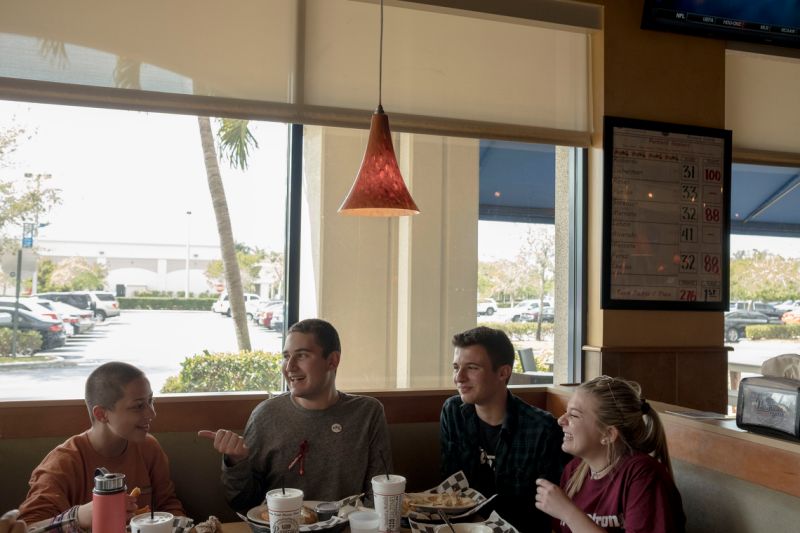Student Teachers
實習教師
"THIS GENERATION OF STUDENTS HAS an instinct for humanity that may help redress what many of their elders concede is an imbalance in American life."
“這一代學生有一種人道直覺,或許能夠幫助重新解決被他們的長輩普遍認為是美國生活失衡的表現的一個問題。”
So TIME wrote in a cover story 50 years ago proiling young leaders from the class of 1968.
本刊在50年前一期講述1968班學生的封面故事中如是寫道。
"The Year of Student Power," we called it then,
“學生權利年”,這是我們那時的叫法,
in a phrase that might just as well apply to this week's story about the students in Parkland, Fla.,
這一說法同樣適用于有本周佛羅里達州帕克蘭市學生案一事,
whose justifiable anger and grit have jolted the dormant gun debate from its sleep.
他們的憤怒和勇氣不僅情有可原,也讓原本已經墮入休眠的槍支爭議再起波瀾。
In a matter of five weeks, the young voices of Marjory Stoneman Douglas High School students have changed minds and even laws.
短短五周時間,瑪喬麗·斯通曼·道格拉斯高中學生的聲音就已改變了人們的看法,也改寫了法律。
Florida, Rhode Island and Oregon tightened gun restrictions.
佛羅里達州,羅德島州和俄勒岡州紛紛加強了自己的槍控措施。
Giant retailers stopped selling assault-style weapons.
零售巨頭們開始停止銷售攻擊性武器。
Longtime corporate partners ended relationships with the National Rile Association.
長期的合作伙伴終止了與全國步槍協會(NRA)的合作關系。
And hundreds of thousands of people are expected to flood the streets on March 24 for March for Our Lives, an event conceived and organized by kids.
預計,3月24日將有無數人涌上街頭,加入“為我們的生命游行”這一由多名孩子構想及組織的活動。
As my own children's head of school put it in a letter to shaken parents, "We are all going to school at Stoneman Douglas."
正如我自己孩子的校長在一封動員家長的信中所寫的那樣,“我們所有人都要去斯通曼·道格拉斯高中。”
America's gun-violence epidemic is complex, and won't be solved quickly.
美國的槍支暴力問題不僅復雜,而且短時間內解決不了。

Clearly the Second Amendment doesn't require that a gun be easier to obtain than a driver's license; the Constitution's drafters feared tyranny, but they also feared chaos.
顯然,第二修正案并沒有規定槍支應該比駕照更容易拿到;因為當初起草憲法的立法者們擔心暴政,但他們也擔心混亂。
And yet reform eforts are doomed if safe and responsible gun owners (I come from a family of them myself) are shut out of the discussion.
然而,如果安全又有責任感的槍支所有者(我自己就來自這樣的家庭)被排除在了討論之外,那么改革的努力就注定會失敗。
One of history's rhymes is that social change begins with the young; another is that change will be imperfect.
歷史的節奏之一就是社會變革始于年輕人;而歷史的另一個節奏則是改變并不會十全十美。
Partial victory is how Brian Weiss, the student featured on the 1968 cover, now describes his generation's eforts.
“部分勝利”,在提及同齡人當初的努力時,布萊恩·韋斯,1968年本刊封面上的那個學生,就是這么形容的。
But in the face of unremitting gun violence in the most developed country on earth ——
然而,面對全球最為發達的國家不斷涌現出槍支暴力事件——
more than 90% of the people under 25 killed by fire arms in all high-income countries are from the U.S.—— inaction is inexcusable.
在所有高收入國家中,25歲以下死于槍擊的人有90%以上的受害者來自美國——不作為將是不容寬恕的。
Young people know this instinctively.
這一點,年輕人憑直覺都知道。
TIME national correspondent Charlotte Alter, who reported and wrote this week's cover story, says it well:
本刊國家通訊員夏洛特·阿爾特,這周的本刊封面故事就是他報道撰寫的,說得好:
"This story isn't just about guns. This story is about kids."
“這個故事不僅事關槍支,還事關孩子。”
And, I would add, about hope.
我想說,這個故事,也事關希望。
譯文由可可原創,僅供學習交流使用,未經許可請勿轉載。











